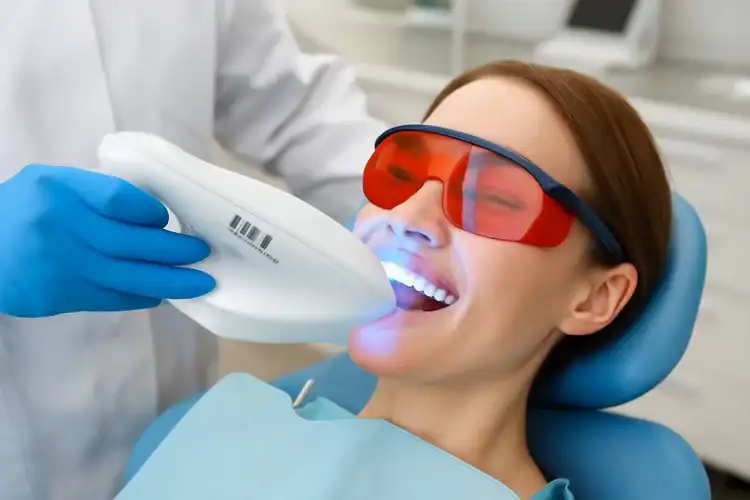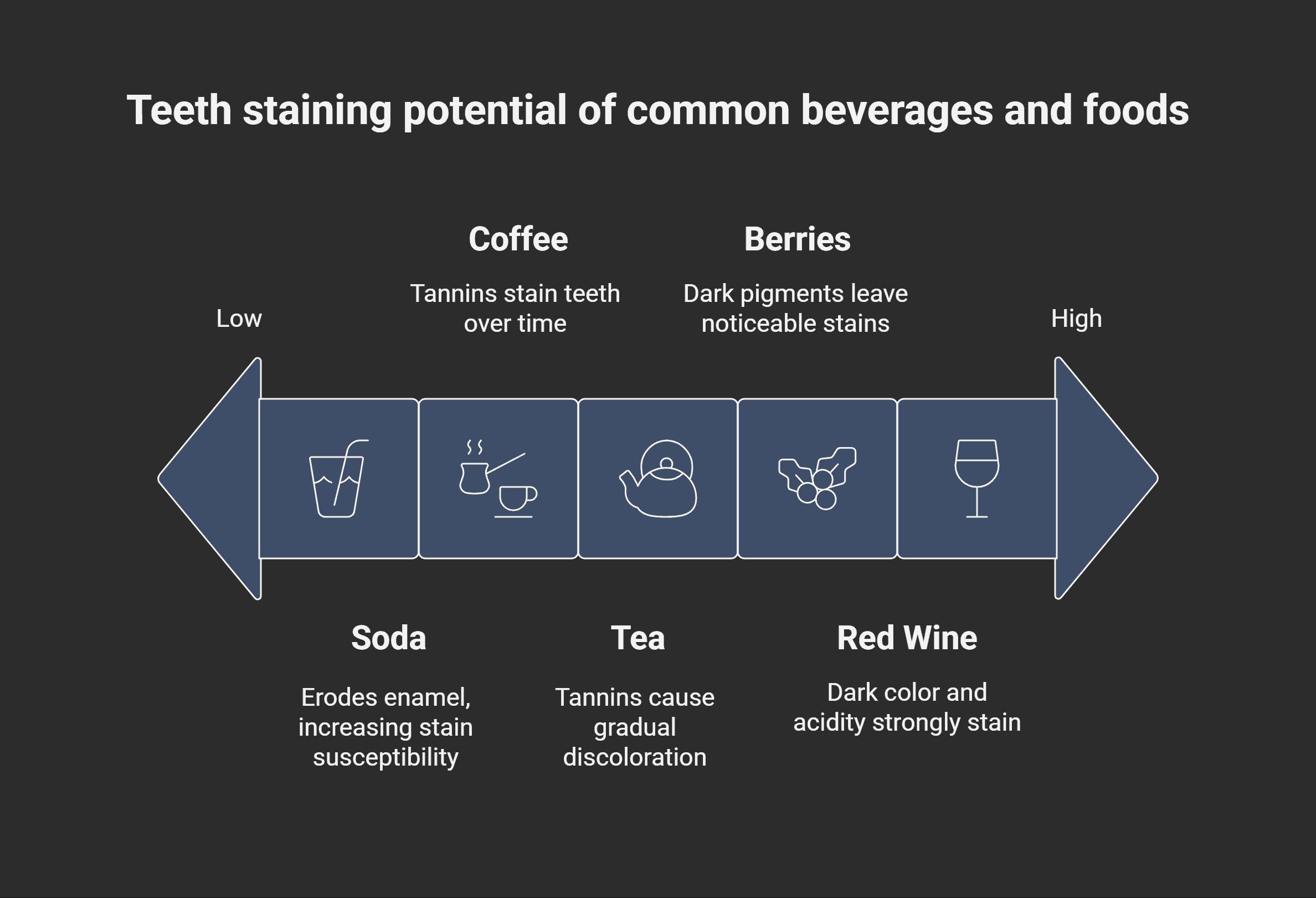Maintaining a white smile after teeth whitening requires more than just occasional touch-ups. Consistent care, mindful eating habits, and a good oral hygiene routine are key to prolonging the results of your treatment. By following proven teeth whitening aftercare tips, you can maintain your smile’s brightness and freshness for a much longer period.
In this article, you’ll learn how whitening works, how long results usually last, and the daily habits that help preserve brightness. We’ll also cover which foods and drinks to avoid, key aftercare tips, and when to consider a professional touch-up to keep your smile looking its best.
How Teeth Whitening Works and How Long Results Last
Teeth whitening is one of the most requested cosmetic dental procedures, but many patients are curious about how it works and how long they can expect the results to last. By understanding the science behind whitening and the factors that influence its durability, you can make more informed decisions about your treatment. However, don’t forget that overall, a regular dental checkup is the best option, as a professional dentist thoroughly examines your oral health.
The Science Behind Whitening
Most whitening treatments rely on bleaching agents such as hydrogen peroxide or carbamide peroxide. These compounds pass through the enamel and break down stains that have built up over time. The chemical process alters the way light reflects off the teeth, resulting in a brighter and lighter appearance that does not compromise the natural tooth structure.
Types of Whitening Treatments
Professional in-office whitening offers the fastest and most dramatic results, as it utilizes higher concentrations of active ingredients under the supervision of a dentist. Custom take-home trays provided by a dental office use a moderate concentration of whitening gel and work gradually over several days or weeks. Over-the-counter products, such as strips or whitening toothpaste, are the most accessible option, but their effects are generally lighter and tend to fade sooner.
Average Longevity of Results
In most cases, whitening results last anywhere between six months and two years. The exact duration depends on several personal factors, including diet, oral hygiene routine, and lifestyle choices. Patients who avoid staining foods and drinks and maintain consistent oral care often see results that last much longer than those who do not.
Factors That Influence Duration
Certain habits can cause whitening results to fade more quickly. Drinking coffee, tea, or red wine daily often leads to new stains, while smoking has one of the most noticeable effects on discoloration. On the other hand, brushing and flossing consistently, using a fluoride toothpaste, and scheduling routine dental cleanings can help extend the benefits of whitening for as long as possible.
Importance of Maintenance and Checkups
Whitening should not be viewed as a one-time procedure. Regular checkups with your dentist allow for early detection of changes in tooth color and provide an opportunity for touch-up treatments if needed.

Key Factors That Can Affect the Longevity of Teeth Whitening
The duration of your whitening results depends on a combination of daily habits, lifestyle, and natural biology. While you can’t control everything, being aware of the biggest influences helps you keep your smile brighter for longer.
According to the Healthline website:
“The best way to whiten your teeth depends on several factors, including your personal preferences, goals, and budget.”
Here are the most critical factors that play a role:
- Dietary habits: What you eat and drink every day has a direct impact on how quickly your teeth absorb stains. Drinks like coffee, tea, and red wine can leave pigments on enamel, while dark fruits like blueberries or blackberries can also do the same.
- Oral hygiene routine: Whitening treatments don’t replace good dental care. If brushing and flossing aren’t done regularly, plaque and tartar can build up, resulting in a dull or yellow appearance. On the other hand, sticking to a consistent routine with fluoride toothpaste and flossing helps preserve results and keeps enamel smooth, so stains have a harder time sticking.
- Age and genetics: As enamel naturally thins with age, the yellow dentin underneath becomes more visible, which can make teeth appear darker even after whitening.
- Type of whitening treatment: Not all whitening methods are equal. In-office treatments use more potent bleaching agents and controlled techniques, which tend to last much longer than drugstore strips or whitening toothpaste.
- Lifestyle choices: Smoking is one of the quickest ways to undo whitening. The tar and nicotine leave stubborn brown or yellow stains that can be difficult to remove.
- Follow-up and maintenance: Professional whitening isn’t a one-time solution. Regular cleanings at your dentist’s office, occasional touch-up treatments, and using dentist-recommended whitening trays at home can all extend the lifespan of your results.
By paying attention to these teeth whitening aftercare tips, you’ll not only maintain your whitening longer but also improve your overall oral health.
If other underlying dental issues, such as toothaches, are present, it’s crucial to address these issues before pursuing teeth whitening treatments. For tips on what to do, check out our guide on what to do if you have a toothache.
Foods and Drinks to Avoid for a Longer-Lasting White Smile
After whitening, your teeth are more susceptible to staining, so it’s essential to limit or avoid foods and drinks that can cause discoloration. Certain substances can penetrate the enamel and stain your teeth, reducing the effectiveness of your whitening results. These are one of the most critical parts of teeth whitening aftercare tips.
Here’s an infographic image that showcases the teeth-staining potential of common beverages and foods on a scale of low to high.

Oral Care Habits to Maintain a Bright Smile After Whitening
Maintaining your smile’s brightness doesn’t end after treatment. Teeth whitening aftercare tips consist of daily habits and consistent oral care, which make all the difference in how long your whitening results last.
- Brush your teeth twice daily with a fluoride toothpaste to maintain strong enamel and reduce plaque buildup.
- Floss every day to remove food particles and plaque between teeth where a toothbrush can’t reach.
- Use a whitening toothpaste a few times per week to help preserve brightness and gently polish away surface stains.
- Rinse with a whitening mouthwash to fight bacteria, freshen breath, and add an extra layer of stain protection.
- Switch to a soft-bristle toothbrush to prevent wearing down your enamel, which can cause your teeth to look dull over time.
- Replace your toothbrush regularly (every 3 months or after an illness) to ensure it remains effective at cleaning.
- Drink water after meals and staining drinks to wash away pigments before they settle on enamel.
- Chew sugar-free gum between meals to increase saliva flow, which helps neutralize acids and keep teeth cleaner.
- Limit snacking between meals since constant eating increases exposure to staining foods and acids.
- Schedule regular dental cleanings to remove tartar and receive professional polishing that restores your teeth’s brightness.
Consistently practicing these teeth whitening aftercare tips and habits not only helps your teeth stay whiter for longer but also supports your overall oral health. With the proper care, your smile will look and feel its best long after whitening treatment.
If you’re dealing with tooth sensitivity after whitening, it’s important to take the necessary steps to prevent discomfort. You can read more about managing tooth sensitivity and how to alleviate its symptoms.
When to Consider Touch-Up Whitening Treatments
Although a good oral care routine helps maintain the whiteness of your teeth, touch-ups are often necessary to keep your smile bright. If you notice your teeth beginning to yellow or become stained despite regular maintenance, it may be time to consider a touch-up whitening treatment. Professional teeth whitening services can help you regain the bright appearance of your smile.
If you’re considering more permanent solutions, such as dental implants, after your whitening treatment, learn about the differences between dental implants and dentures to make an informed decision about your oral health.
Touch-up treatments are not only about appearance. They are also about timing. Most patients benefit from scheduling a touch-up every six to twelve months, although some may require them more frequently, depending on their diet and lifestyle. Coffee drinkers, red wine lovers, and smokers often notice stains returning more quickly. To extend their whitening results, they can maintain their teeth more frequently.
It’s also worth remembering that not all touch-ups require being done in the dental chair. At-home options recommended by your dentist, such as custom whitening trays, can help you maintain brightness between professional visits. These smaller steps help the professional touch-ups last longer and maintain a consistent smile.
Contact Us for Help!
Ready to brighten your smile? Visit Tsawwassen Family Dental for professional teeth whitening treatments that deliver lasting results. Book your appointment today!
Preserve Your Results with Teeth Whitening Aftercare
Maintaining a white smile requires dedication to proper oral hygiene and making wise choices regarding your diet and lifestyle. By consistently following teeth whitening aftercare tips, which are oral care practices, avoiding discoloring foods, and considering touch-up treatments, you can preserve the brightness of your smile for an extended period.
Tsawwassen Family Dental is also here to provide premium dental services in Delta BC and personalized oral care for you and your family, from urgent emergency dental treatment to advanced cosmetic dental solutions.
FAQ about teeth whitening aftercare tips
Below are some frequently asked questions about teeth whitening aftercare tips that can provide more clarity on maintaining your white smile after whitening treatments.
How long does teeth whitening last before touch-ups are needed?
The effects of teeth whitening can last anywhere from six months to two years, depending on oral hygiene practices, teeth whitening aftercare tips, and dietary habits. Periodic touch-ups may be required for long-lasting results.
What foods and drinks should I avoid after teeth whitening?
To keep your teeth white, avoid coffee, tea, red wine, and acidic foods. These can stain your teeth over time and cause the whitening results to fade.
How can I maintain a white smile after whitening treatments?
Brush and floss regularly, use whitening products, and avoid foods that can stain your teeth. Using a whitening mouthwash can also help preserve the brightness.
Can I whiten my teeth again immediately after the first treatment?
It’s best to wait several months between treatments to avoid damaging your enamel. Your dentist can recommend the right timing for touch-up treatments based on your individual needs.
What oral care routine helps keep teeth white after whitening?
A good oral care routine includes brushing with fluoride toothpaste, flossing daily, using a whitening mouthwash, and avoiding foods that stain your teeth.
Do you have your own special teeth whitening aftercare tips?
Share your teeth whitening aftercare tips with us in the comments section.


